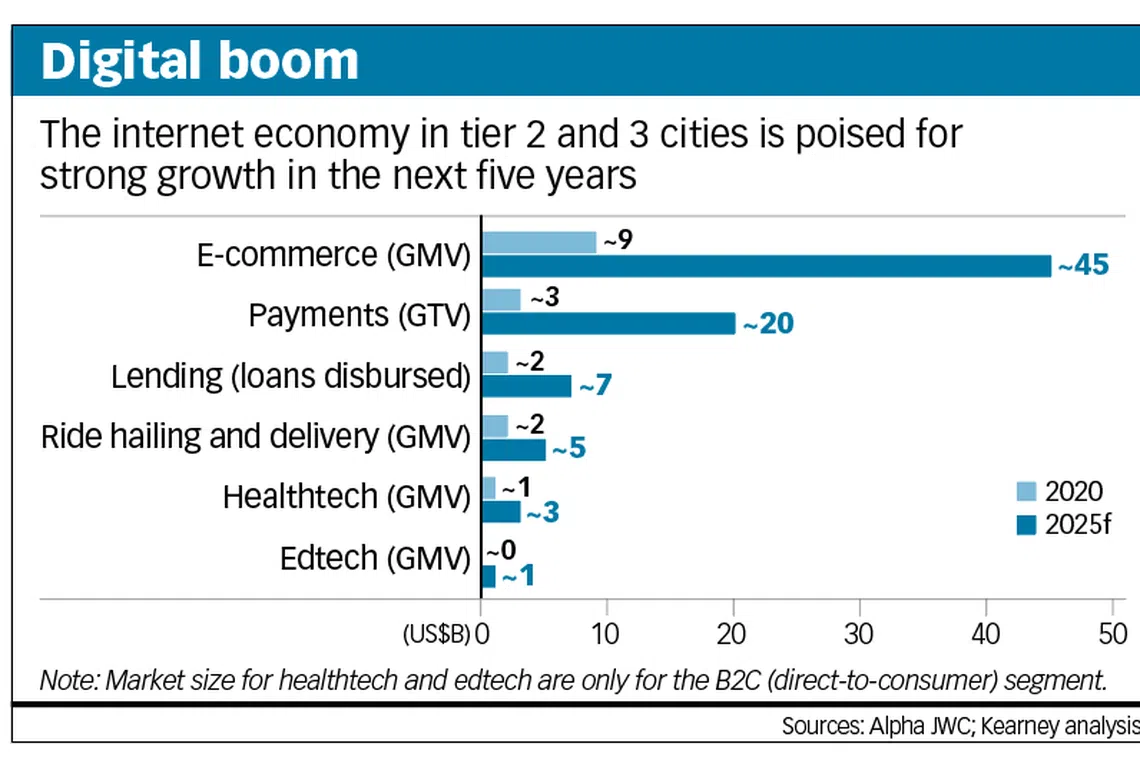Indonesia's next digital boom lies beyond metropolitan cities

THE next wave of growth in Indonesia's digital economy will come from non-metropolitan areas, according to research from Kearney and venture capital firm Alpha JWC Ventures.
In tier two and three cities, the multibillion-dollar sectors of e-commerce, payments and lending are poised for a three to six times growth in gross merchandise value by 2025.
These 177 cities with a growing number of middle-class consumers are just starting to adopt digital habits that tier one cities adopted five years ago, noted the study, which was published in collaboration with Credit Suisse, Amazon Web Services and Xiaomi Indonesia.
This comes as the digital economy in tier one cities, which include the Greater Jakarta area, Bandung and Surabaya, become increasingly competitive and saturated.
Jakarta's proportion of Indonesia's gross domestic product (GDP) is expected to fall by 5 to 6 per cent by 2030. In contrast, tier three and two cities' share of national GDP is expected to increase by 3 to 5 per cent and contribute up to US$77 billion, the report said.
Indonesia's next digital boom will bank on companies lowering the barriers to adopting digital services. More than half of respondents in tier two and three cities who shunned online activities said they could not easily understand apps and the Internet.
Navigate Asia in
a new global order
Get the insights delivered to your inbox.
There was also a perception that online activities are more expensive because of administrative and shipping fees, and cheaper offline substitutes. Respondents also raised concerns about product availability and quality.
There is hence a huge potential for tech companies to expand more aggressively into these nascent markets, especially after the pandemic accelerated digital adoption, the report noted.

Unfazed by the Covid-19 crisis, digital investments in Indonesia more than doubled in 2020 to US$4.4 billion, with 173 deals closed.
E-commerce, digital payments and lending is poised for mass adoption in tier two and three cities and expected to grow 30 to 50 per cent annually for the next five years. In particular, e-commerce gross merchandise value (GMV) could hit US$45 billion, five times that of 2020's estimated US$9 billion.
The nascent sectors of edtech and healthtech are expected to grow three times from their 2020 GMV. However, ride hailing and food delivery are likely to experience a more modest growth of 27 to 30 per cent each year as people continue to prefer their own transportation methods, the research found.
Speaking on a virtual panel discussion at the launch of the report, Gojek's head of corporate strategy, Jonathan Barki, said regions outside of tier one cities lack the density needed to create an ecosystem with network effects that benefit a technology platform.
Still, that is where the next wave of growth is, he added. "The most crucial part is actually building out the infrastructure... and a lot of this includes extending supply into the cities (through cloud kitchens and cost-efficient logistics, for example)."
Decoding Asia newsletter: your guide to navigating Asia in a new global order. Sign up here to get Decoding Asia newsletter. Delivered to your inbox. Free.
Copyright SPH Media. All rights reserved.
